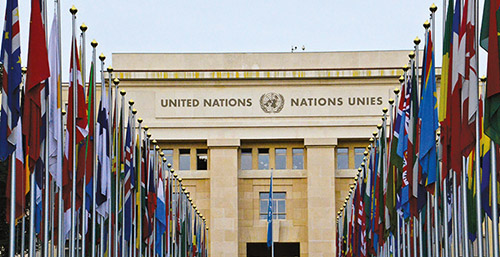
This week was the 77th anniversary of the establishment of the United Nations. The United Nations replaced the ill-fated League of Nations. The League of Nations, of course, was the first worldwide governmental organization of nations.
Its purpose was to ensure world peace. The organization lasted for 26 years and three months, from January 1920 to April of 1946. Ultimately, the League of Nations failed both in fulfilling its purpose as well as not lasting as an organization—the United Nations having taken its place on the world stage.
Why did the League of Nations fail?
Historians will tell you five reasons:
1) Because the United States never joined it.
2) They may point to the fact that it had no armed forces of its own.
3) Some will attribute its demise to the fact that it was generally weak.
4) Some will point out that when Germany withdrew and subsequently attacked the world, its reputation suffered terribly and was never to recover.
5) Finally, other historians attribute its demise to a combination of the above factors.
Perhaps a Deeper Reason
Perhaps, there may be a deeper reason. Perhaps it is a reason that stands at the very heart of why the world exists. But first, a short preface:
Hashem is the ultimate Giver, and He rewards good and punishes evil. The observance of Shabbos is where and when we declare this ideal to the world. Shabbos has always been viewed as the symbol or flag of the Jewish nation. Just as patriots look at their flag as more than a mere dyed cloth with fancy designs, so too is Shabbos viewed in the eyes of the Jewish people. It is a sign of our deep belief in God’s absolute Oneness. He created the world and all that is in it. He is the one and only, the source of everything; the One who rewards good and punishes evil. Ain Od Milvado.
Not a Kodak Moment
The city of Rochester, New York is the home of a very fine yeshiva. It is also the headquarters of the Eastman Kodak Company. George Eastman was an American millionaire and entrepreneur who implemented a very non-Shabbos friendly calendar at his company from the years 1928-1989.
George Eastman’s calendar had 13 months with 28 days each, divided into exactly four weeks. An extra day called “Year Day” was added as a holiday at the end of the year. It did not belong to any week. The repercussions of Eastman’s calendar and Year Day would mean that every seven years Shabbos would be on a Monday for the whole year. The next year it would be on a Tuesday for the whole year; and so on and so on.
George Eastman Was Stubborn
George Eastman pushed and pushed his agenda. He pushed so hard that the League of Nations wanted to adopt his calendar wholesale. To promote the calendar, the International Fixed Calendar League was founded in 1923. The plan was selected by the League of Nations as the best of 130 calendar proposals put forward. The League opened offices in London and in Rochester, New York.
A special section of the League of Nations called Communications and Transit was formed in 1923 and the calendar committee was put together. There were six members of the committee: a Dutch professor, a French astronomer, the president of the International Chamber of Commerce and three representatives of various churches—the Vatican, the Greek Orthodox Church and the archbishop of Canterbury. They met in Geneva. The Jews were promised a place on the committee, but this was denied them.
On January 31, 1925, the committee ultimately agreed to allow four Jewish leaders to attend the February 16 hearing in Geneva. These leaders were Orthodox rabbis. It was temporarily delayed, but the issue was pushed forward almost everywhere.
In 1928, Congressman Stephen Porter tried to get the United States committed to the idea of the reformation of the calendar, but Solomon Bloom, a New York congressman, was able to put a stop to it by demanding a hearing from those whom it would affect.
The League of Nations took up the idea again in 1929, and once again the Jewish world mobilized to ensure that Shabbos was not sacrificed on the altar of business efficiency.
The Possible Deeper Reason
The deeper reason we are suggesting for the failure of the League of Nations is that they tried to up-end the observance of Shabbos throughout the world. We know from Megilas Esther that Hashem employs socioeconomic and political forces to make things happen. Perhaps there was a Divine punishment to this international organization on account of this attempt.
Perhaps this can answer another question as well, in regard to Sefer Tehillim. The second chapter of Sefer Tehillim begins as follows:
“Why have nations gathered and [why do] kingdoms think vain things? Kings of a land stand up, and nobles take counsel together against the Lord and against His anointed? Let us break their bands and cast off their cords from us.” (Tehillim 2: 1-3)
But when, in history, did this happen? Rashi brings two explanations: one during the time of Moshiach and the other in regard to Dovid HaMelech himself. The Ibn Ezra agrees with the second pshat in Rashi. But if it just refers to the Plishtim, the use of the plural terms “nations” and “kingdoms” and gathering seems somewhat strange. If, however, we are referencing a League of Nations, it seems to fit slightly better.
This idea may either be a third possibility, or it could possibly be part of the first pshat in Rashi. Regardless, the battle to save Shabbos in the years 1924 to 1931 is a fascinating period in global history. Perhaps we should place more effort into studying it.
The author can be reached at yairhoffman2@gmail.com










